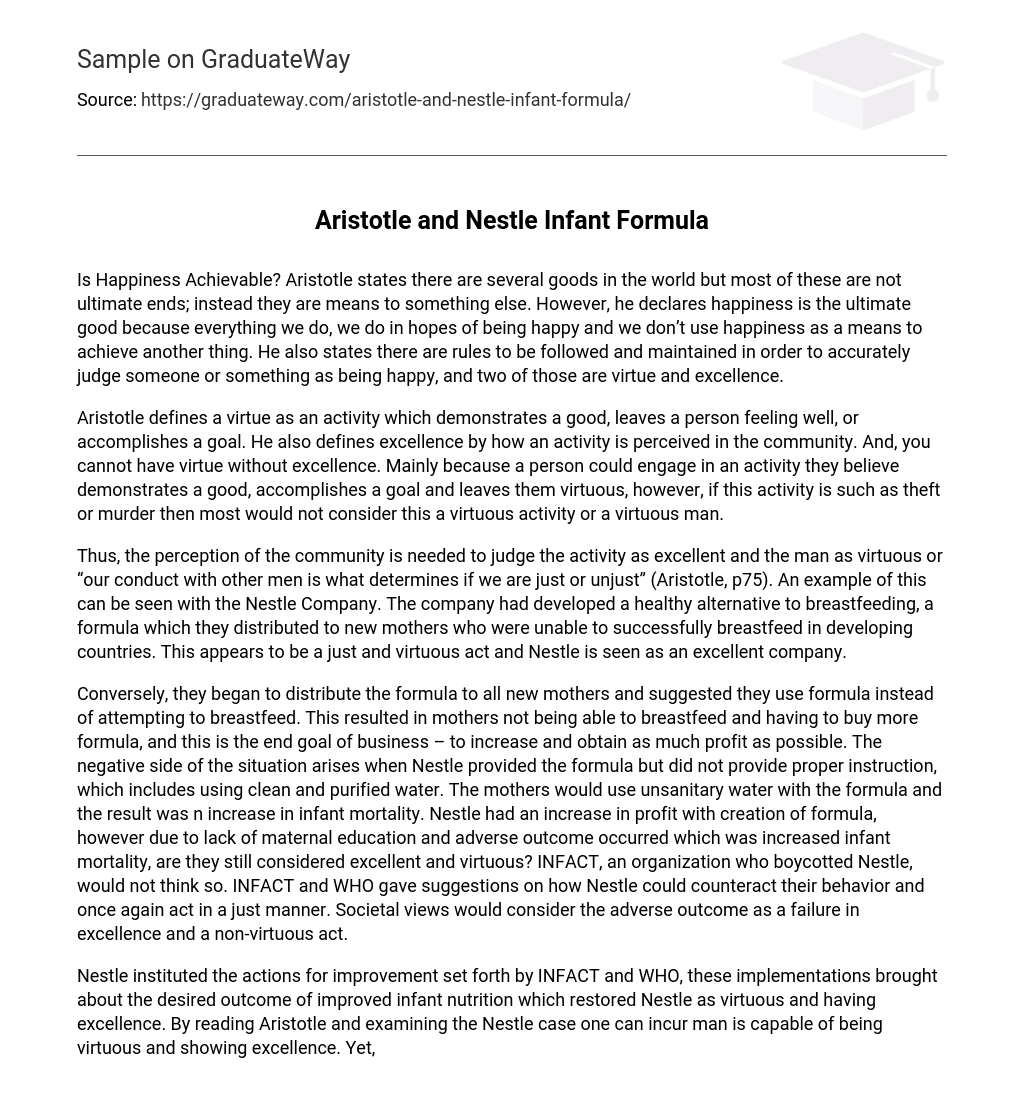Is Happiness Achievable? Aristotle states there are several goods in the world but most of these are not ultimate ends; instead they are means to something else. However, he declares happiness is the ultimate good because everything we do, we do in hopes of being happy and we don’t use happiness as a means to achieve another thing. He also states there are rules to be followed and maintained in order to accurately judge someone or something as being happy, and two of those are virtue and excellence.
Aristotle defines a virtue as an activity which demonstrates a good, leaves a person feeling well, or accomplishes a goal. He also defines excellence by how an activity is perceived in the community. And, you cannot have virtue without excellence. Mainly because a person could engage in an activity they believe demonstrates a good, accomplishes a goal and leaves them virtuous, however, if this activity is such as theft or murder then most would not consider this a virtuous activity or a virtuous man.
Thus, the perception of the community is needed to judge the activity as excellent and the man as virtuous or “our conduct with other men is what determines if we are just or unjust” (Aristotle, p75). An example of this can be seen with the Nestle Company. The company had developed a healthy alternative to breastfeeding, a formula which they distributed to new mothers who were unable to successfully breastfeed in developing countries. This appears to be a just and virtuous act and Nestle is seen as an excellent company.
Conversely, they began to distribute the formula to all new mothers and suggested they use formula instead of attempting to breastfeed. This resulted in mothers not being able to breastfeed and having to buy more formula, and this is the end goal of business – to increase and obtain as much profit as possible. The negative side of the situation arises when Nestle provided the formula but did not provide proper instruction, which includes using clean and purified water. The mothers would use unsanitary water with the formula and the result was n increase in infant mortality. Nestle had an increase in profit with creation of formula, however due to lack of maternal education and adverse outcome occurred which was increased infant mortality, are they still considered excellent and virtuous? INFACT, an organization who boycotted Nestle, would not think so. INFACT and WHO gave suggestions on how Nestle could counteract their behavior and once again act in a just manner. Societal views would consider the adverse outcome as a failure in excellence and a non-virtuous act.
Nestle instituted the actions for improvement set forth by INFACT and WHO, these implementations brought about the desired outcome of improved infant nutrition which restored Nestle as virtuous and having excellence. By reading Aristotle and examining the Nestle case one can incur man is capable of being virtuous and showing excellence. Yet, Aristotle also discusses there are other rules for behaving in such a manner. The main rule is acting and maintaining emotions in moderation.
He states that the ideal virtuous man will choose to act or to express his emotions in a way which is in the middle instead of either extreme. Aristotle also says this is extremely difficult to achieve because human nature is to side on the excessive end, especially in matters where pleasure is achieved. One reason he speculates this is difficult is because “it is engrained in us from infancy to choose activities which bring us pleasure and is thus a guiding principle in our choice of actions” (Aristotle, p77).
After obtaining this knowledge, the question arises that although man is capable of engaging in activities leading to happiness, is man ever truly happy? One could ask this question because after attaining happiness from one activity man moves on to another in hopes it will bring happiness as well. Aristotle states “because we are men we need external goods for our fortune” (p91). Therefore, when it comes to happiness is man ever satiated or could this just be a part of man’s nature?





